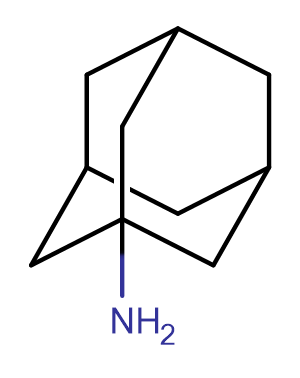
1-Adamantylamine
CAS No. 768-94-5
1-Adamantylamine( Amantadine | 1-Adamantanamine | 1-Aminoadamantane )
Catalog No. M21211 CAS No. 768-94-5
1-Adamantylamine is an antiviral is a weak antagonist of the NMDA-type glutamate receptor increases dopamine release and blocks dopamine reuptake.?
Purity : >98% (HPLC)
 COA
COA
 Datasheet
Datasheet
 HNMR
HNMR
 HPLC
HPLC
 MSDS
MSDS
 Handing Instructions
Handing Instructions
| Size | Price / USD | Stock | Quantity |
| 500MG | 35 | Get Quote |


|
| 1G | Get Quote | Get Quote |


|
Biological Information
-
Product Name1-Adamantylamine
-
NoteResearch use only, not for human use.
-
Brief Description1-Adamantylamine is an antiviral is a weak antagonist of the NMDA-type glutamate receptor increases dopamine release and blocks dopamine reuptake.?
-
Description1-Adamantylamine is an antiviral is a weak antagonist of the NMDA-type glutamate receptor increases dopamine release and blocks dopamine reuptake.?(In Vitro):Amantadine (0-500 μM, 26 h) inhibits SARS-CoV-2 replication, with IC50 concentrations between 83 and 119 μM.Amantadine (0-100 μg/mL, 24-72 h) markedly inhibits the proliferation of HepG2 and SMMC?7721 cells.Amantadine (0-75 μg/mL, 48 h) arrests the cell cycle at the G0/G1 phase and induces apoptosis.Amantadine (0-75 μg/mL, 48 h) reduces the levels of the cell cycle?related genes and proteins (cyclin D1, cyclin E and CDK2), reduces Bcl-2 and increases the Bax protein and mRNA levels.(In Vivo):Amantadine (25 mg/kg, IP, once daily for 3 days) inhibits surgery induced neuroinflammation and learning and memory impairment.
-
In VitroAmantadine (0-500 μM, 26 h) inhibits SARS-CoV-2 replication, with IC50 concentrations between 83 and 119 μM. Amantadine (0-100 μg/mL, 24-72 h) markedly inhibits the proliferation of HepG2 and SMMC?7721 cells. Amantadine (0-75 μg/mL, 48 h) arrests the cell cycle at the G0/G1 phase and induces apoptosis.Amantadine (0-75 μg/mL, 48 h) reduces the levels of the cell cycle?related genes and proteins (cyclin D1, cyclin E and CDK2), reduces Bcl-2 and increases the Bax protein and mRNA levels. Cell Viability Assay Cell Line:Vero E6 cells Concentration:500 μM, 100 μM, 20 μM, 4 μM, and 8 nM Incubation Time:26 h Result:Caused a concentration-dependent reduction (IC50=83 μM) of viral nucleic acids in the supernatant 26 h after infection at 10-500 μM. Caused a concentration-dependent reduction (IC50=119 μM) of viral nucleic acids in the cytosol 26 h after infection.Cell Proliferation Assay Cell Line:Human HCC cell lines (HepG2 and SMMC-7721) and normal hepatocellular cells (L02 cells) Concentration:0, 1, 2, 5, 10, 25, 50 and 100 μg/mL Incubation Time:24, 48 and 72 h Result:Inhibited cellular proliferation in a time- and dose-dependent manner in HepG2 and SMMC-7721 cells.Cell Cycle Analysis Cell Line:HepG2 and SMMC-7721 cells Concentration:0, 10, 25, 50 and 75 μg/mL Incubation Time:48 h Result:Significantly increased the population of HepG2 and SMMC-7721 cells in the G0/G1 phase in a dose-dependent manner, and significantly decreased the number of HepG2 cells in the S phase.Apoptosis Analysis Cell Line:HepG2 and SMMC-7721 cells Concentration:0, 10, 25, 50 and 75 μg/mL Incubation Time:48 h Result:Markedly increased the percentage of apoptotic HepG2 and SMMC-7721 cells (early- and late-stage apoptosis) in a dose-dependent manner.Western Blot Analysis Cell Line:HepG2 and SMMC-7721 cells Concentration:0, 10, 25, 50 and 75 μg/mL Incubation Time:48 h Result:Showed downregulation of cyclin D1, cyclin E and CDK2, and showed a decrease in Bcl-2 levels and an increase of Bax levels in HepG2 and SMMC-7721 cells. RT-PCR Cell Line:HepG2 and SMMC-7721 cells Concentration:0, 10, 25, 50 and 75 μg/mL Incubation Time:48 h Result:Revealed an increase in Bax and decrease in Bcl-2 genes.
-
In VivoAmantadine (25 mg/kg, IP, once daily for 3 days) inhibits surgery induced neuroinflammation and learning and memory impairment. Animal Model:Fischer 344 rats (Four-month old, male, 290-330 g, 15 rats each group) Dosage:25 mg/kg Administration:IP, once daily for 3 days (the first dose at 15 min before surgery)Result:Inhibited surgery induced neuroinflammation and learning and memory impairment, increased GDNF (glial cell line-derived neurotrophic factor) that was co-localized with glial fibrillary acidic protein (an astrocytic marker) in the hippocampus.
-
SynonymsAmantadine | 1-Adamantanamine | 1-Aminoadamantane
-
PathwayOthers
-
TargetOther Targets
-
RecptorOthers
-
Research AreaCardiovascular Disease
-
IndicationComaHeart ArrestAnoxia
Chemical Information
-
CAS Number768-94-5
-
Formula Weight151.25
-
Molecular FormulaC10H17N
-
Purity>98% (HPLC)
-
SolubilityDMSO:1 mg/mL (6.61 mM)
-
SMILESNC12CC3CC(CC(C3)C1)C2
-
Chemical Name——
Shipping & Storage Information
-
Storage(-20℃)
-
ShippingWith Ice Pack
-
Stability≥ 2 years
Reference
1.Lim J K Wooten D Siegel R et al. Amantadine in treatment of chronic hepatitis C virus infection?[J]. Journal of Viral Hepatitis 2005 12(5):445-455.
molnova catalog



related products
-
Polymyxin B
Polymyxin B, an antibiotic, combats Gram-negative infections through high-affinity binding to the bacterial wall's lipopolysaccharides (LPS), neutralizing endotoxin effects and inducing bacterial cell death by enhancing permeability.
-
alpha-Tocopherolquin...
During hypoxia in rats, levels of α-tocopherylquinon have been found to rise. It is reported to downregulate the respiratory activity of mitochondria.
-
TLX agonist 1
TLX agonist 1 is an orphan nuclear receptor tailless (TLX NR2E1)?modulator.



 Cart
Cart
 sales@molnova.com
sales@molnova.com


